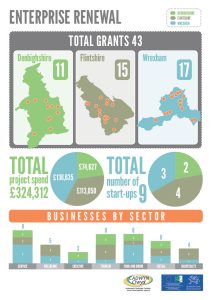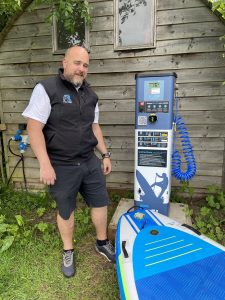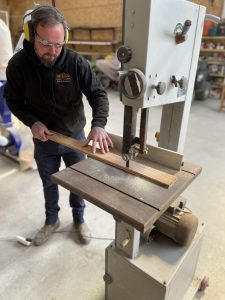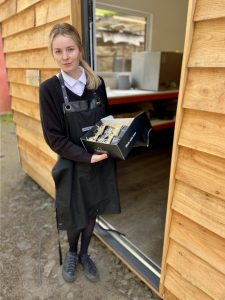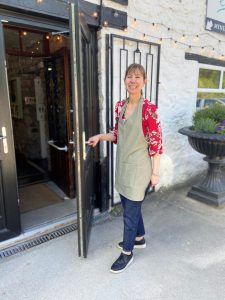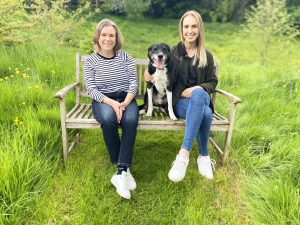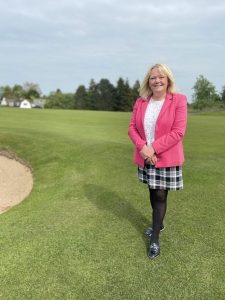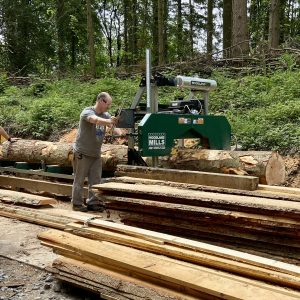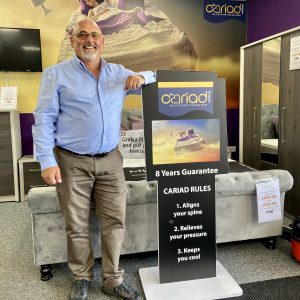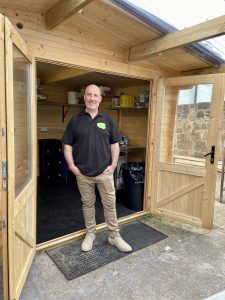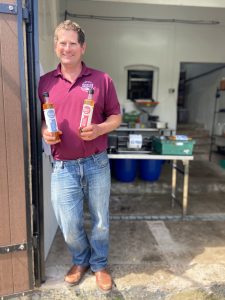
Investing in
Business & Innovation
LEADER Theme 2 – Facilitating pre-commercial development, business partnerships and short supply chains
LEADER theme 2 is all about local organisations, groups and businesses looking at new ways of making things, doing things and working together. In particular, Cadwyn Clwyd will work with the business community to enable the provision of tailored pre-commercial support to help local entrepreneurs test the viability of new business concepts and ideas in a supportive and managed risk environment. Example projects will include exploring proof of concept and feasibility of new business ideas, piloting the development of new food and non-food products, facilitating access to mentoring and guidance. The theme also includes targeted support for businesses operating in the tourism, agriculture and forestry, leisure, accommodation, retail and food sectors to improve linkages and physical and digital networking. LEADER cannot provide assistance that would be considered State Aid, so all assistance to commercial operations will focus on pre-commercial work and the finding of all pilots and feasibility studies will be published for the benefit of all.
Projects delivered include facilitating a North East Wales Food Forum, a Learning Journeys project enabling local groups and businesses to learn best practice from others, a pilot project to develop a bank of volunteers, and a project working with a food technology centre to develop new food products linked to the local area.
GRANT FUNDING - CLOSED
ENTERPRISE RENEWAL
Grant funding was available to micro and small businesses in rural Denbighshire, Flintshire & Wrexham recover from the Covid-19 pandemic. Social and community enterprises were also able to apply for grant funding.
Businesses were able to apply for a 50% grant, up to a maximum application value of £10,000 grant funds (which was £5,000 grant funds and £5,000 applicant cash match funding) towards costs relating to the introduction of new products or processes. The minimum application value was £2,000 (which was £1,000 grant funds and £1,000 applicant cash match).
Due to the small-scale of the support available, this scheme was best suited to micro-businesses and new small business start-ups
A key priority for the project was supporting enterprises introduce new products and/or new processes that the enterprise had not delivered before. Retrospective applications for costs already incurred by the applicant were not be permitted. The project focused on supporting the introduction of innovative technologies and new ways of doing businesses. New processes can improve productivity, increase turnover, profitability and market share, by making the business more competitive. Qualifying projects typically include expansion, diversification and modernisation of an existing business. Expenditure on new investment in assets, such as equipment, in the development of a marketing strategy, or implementation of IT technology to enhance existing business were supported.
examples of eligible funding:
- Purchase or lease / hire of new machinery and equipment
- Installation costs
- Professional fees for services
- Marketing strategies and / or marketing costs for new products or processes
- Digital, communication and information technology
- Computer and network hardware and / or software
- Broadband technology
- Website and App development
- Accounting / inventory / ordering systems
- Sustainable / renewable energy
- Waste minimisation and recycling projects
- Site improvements
Case Studies:
To find out more, click on the infographic below to go to the full case study document, or alternatively by clicking on the name of the business to read individual case studies.
The project was funded through LEADER, an initiative to support rural development projects initiated at the local level to revitalise rural areas and create jobs. It is part of the Welsh Government Rural Communities – Rural Development Programme 2014 – 2020, which is financed by the Welsh Government and European Agricultural Fund for Rural Development (EAFRD).
